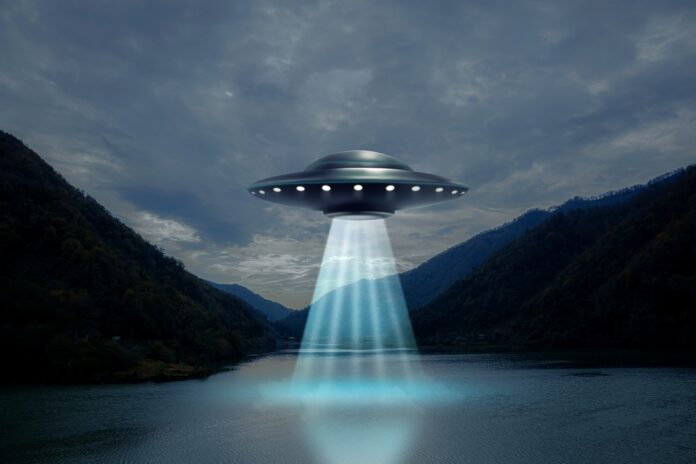The Fermi paradox boils down to a simple question: where is everybody? In other words, if we’re not alone in the universe, then why haven’t we seen any evidence for aliens yet? To date, there is no consensus resolution to the Fermi Paradox…and we still have no evidence for aliens.
Who Came Up With the Fermi Paradox?
(Credit: Janusz Pienkowski/Shutterstock)
Lore has it that in the summer of 1950, famed Italian-American physicist Enrico Fermi was out to lunch one day with some friends and colleagues. The conversation turned to talk of UFO sightings, space travel, and alien civilization. In response to the conversation, Fermi simply blurted out “But where is everybody?”
After further calculations to back up his original interjection, this statement came to be known the Fermi paradox in his honor. If the universe is full of advanced alien civilizations, then we should have ample evidence for their existence by now. Instead, we have found absolutely nothing, and for all intents and purposes the cosmos is empty of life.
The argument that the universe should be full of life is a good one. There’s nothing particularly special about us. The Milky Way is just another spiral galaxy. The Sun is just another medium-sized star. The Earth is just another small, rocky world. All the ingredients needed to make life: water, hydrogen, carbon, and so on, are all fantastically abundant in the universe.
Plus, life emerged on Earth roughly four billion years ago, but the universe itself is over three times that age. The Milky Way galaxy is roughly 13 billion years old and contains hundreds of billions of stars. The Earth was certainly not the first rocky planet to form in all that time, and life in the galaxy should be ancient, giving any sufficiently advanced civilization more than enough time to spread throughout the galaxy…making them easily detectable.
So…where is everybody?
Read More: Fact or Fiction: What Is The Truth Behind Alien Conspiracy Theories?
What Are Some Solutions to the Fermi Paradox?
(Credit: New Africa/Shutterstock)
In the decades since Fermi’s question, many scientists and creative thinkers have come up with a variety of possible solutions to the paradox.
1. Intelligence Is Rare
One solution is to confront the basic assumptions of the paradox head-on. Maybe there is something special about life, especially intelligent life. Maybe the emergence of intelligence is a fundamentally rare occurrence. Yes, there are many stars and planets out there, but if intelligence is rare enough, then we shouldn’t expect to encounter any aliens. In this scenario, we are well and truly alone in the universe.
2. Great Filter Approach
Another solution is that life, especially intelligent life, may be relatively common, but the ability of advanced civilizations to make themselves undetectable is likely rare.
For example, there could be “great filters” that prevent the rise of advanced civilizations above a certain level. We only need to point to our own propensity for self-destruction in the form of nuclear weapons or climate change for ready examples of how a great filter might work. And if we don’t do it ourselves, maybe nature can do it for us: there have been many mass extinctions in the history of the Earth, and it wouldn’t take much to destroy an aspiring spacefaring civilization.
3. Zoo and Dark Forest Hypotheses
Another set of approaches is to argue that aliens are common, but for some reason we have a hard time detecting them. For example, in the zoo hypothesis, advanced aliens are out there and know we exist, but they have chosen to isolate the Earth to allow humanity to progress along its natural course without outside interference. Or in the “dark forest” hypothesis, aliens prefer to stay quiet and hidden, fearing that an aggressive, expansionist species may wipe them out.
Or it might be that our math is off. Life might be common, with hundreds or even thousands of intelligent species spread throughout the galaxy at any one time. But the combination of extreme distances and long travel times makes these disparate civilizations effectively isolated from each other, despite whatever feats of technological sophistication they may be able to achieve.
Read More: The Drake Equation: What Are the Odds That Aliens Exist?
Are We Alone in the Universe?
(Credit: Amanda Carden/Shutterstock)
Ultimately we do not know if we are alone in the universe. To date, we have found no evidence for life outside the Earth. We have detected no radio signals from intelligent species, and we have not found any artifacts, like mega-engineering projects, in our surveys.
Searches in the universe continue. While private groups largely focus on detecting signals from intelligence, most astronomers instead focus on broader searches for any signs of life, to the point that finding an analog of Earth is a man priority for NASA’s next generation of space telescopes.
Read More: New SETI Tool Expands the Search for Intelligent Life in the Universe
Article Sources
Our writers at Discovermagazine.com use peer-reviewed studies and high-quality sources for our articles, and our editors review for scientific accuracy and editorial standards. Review the sources used below for this article:
Paul M. Sutter is a theoretical cosmologist, NASA advisor, host of the “Ask a Spaceman” podcast, and a U.S. Cultural Ambassador. He is the author of “Your Place in the Universe” and “How to Die in Space.”
Source : Discovermagazine






